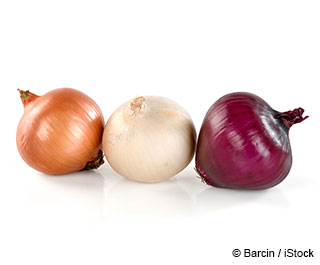Peeling Down the Onion
Botanical name: Allium cepa

Whether white, yellow or red, onions are one of the world’s most popular and versatile vegetables, delivering an unmistakable, pungent heat. They’re in demand for cold salads and hot soups, sliced in rings or solid disks on burgers, and chopped in relish. The delicious caramelization that takes place when onions are sautéed is due to their high sugar content.1
You may also try them sautéed with bell peppers for a tasty fajita ingredient. Out of all the different onions sold today, Spanish onions are among the mildest,2 while the Vidalia variety is known for its sweetness, thanks to its high sugar and water content.3
But what’s responsible for the sharp fragrance and flavor emitted by onions that causes you to tear up? Previously, this effect was thought to come from the enzyme alliinase, which works through the biochemical pathway that results in the onion’s distinctive flavor. However, recent findings reveal that this effect does not come from this reaction, but is rather synthesized by a lachrymatory-factor synthase, a previously undiscovered enzyme.4
Health Benefits of Eating Onions
The humble onion is loaded with numerous health benefits, and scientists are still discovering how beneficial this vegetable really is. It’s a very good source of vitamins C and B6, phosphorus, folate and potassium. The manganese in onions also provides health-protective antioxidant properties.5 Studies show that allium vegetables like onions and garlic may have cancer-6 and diabetes-fighting7 properties, while decreasing blood vessel stiffness by releasing nitric oxide.8
Significant amounts of polyphenols (another phytochemical in onions) and an antioxidant flavonoid called quercetin (which has proven anticancer, anti-inflammatory and antidiabetic functions
9) account for the reputation onions have for disease prevention.
10
Cooking can diminish the potency of the quercetin in onions, but as long as they are cooked gently, the reduction is not very significant.
11 Regardless, you should avoid overcooking or burning onions to preserve this precious nutrient. The flavonoids in onions are more concentrated in their outer layers,
12 so discard as little as possible.
Onions are one of Dr. Mercola’s most highly recommended vegetables. Check out their nutrition facts below.13
Onions Nutrition Facts
Serving Size: 3.5 ounces (100 grams), raw
| Calories |
40 |
|
| Calories from Fat |
1 |
|
| Total Fat |
0 g |
0% |
| Saturated Fat |
0 g |
0% |
| Trans Fat |
|
|
| Cholesterol |
0 mg |
0% |
| Sodium |
4 mg |
0% |
| Total Carbohydrates |
9.34 g |
3% |
| Dietary Fiber |
1.7 g |
7% |
| Sugar |
4.24 g |
|
| Protein |
1.1 g |
|
| Calcium 2% |
Iron |
1% |
*Percent Daily Values are based on a 2,000 calorie diet. Your daily values may be higher or lower depending on your calorie needs.
Studies Done on Onions
Studies showed strong evidence that eating onions may considerably reduce the risk of stomach cancer14 In another study, beneficial effects of red, yellow and white onion extracts were noted for their antioxidant and antimutagenic (cell mutation-prohibitive) activity – better than butylated hydroxytoluene (BHT), a synthetic chemical added to foods as a preservative, and ascorbic acid. Free radical-scavenging activity increased, depending on the concentration.15
Onion Healthy Recipes:
Rainbow Chard with Red Onions

|
Ingredients:
|
|
✓ 1 medium red onion, sliced into half moons
|
✓ 1 tablespoon coconut oil
|
✓ 1 bunch chard or spinach, chopped finely
|
|
✓ 1 tablespoon organic soy sauce
|
✓ 1 teaspoon lemon juice
|
|
Procedure:
- Place chopped onion into skillet with coconut oil. Cook for about three minutes.
- Add the chard, cook for another two minutes, then add the organic soy sauce and lemon juice. Cook for another two minutes.
- Place into a medium-sized bowl and serve. Makes four servings.
(From Healthy Recipes for Your Nutritional Type by Dr. Mercola)
Onion Fun Facts
According to “Top 100 Food Plants,” Egyptian mummies have been found with onions tucked into their pelvic regions, flattened against their ears, and attached to their feet and legs. Flowering onions were sometimes placed on their chests. King Ramses IV, who died in 1160 B.C., was found with onions inserted into his eye sockets.16
Summary
For centuries, onions have been used to liven up food recipes and have been added to ancient concoctions for medicinal purposes. Modern medicine has found onions to be highly beneficial in almost every area of the body, from maintaining cell health to preventing inflammation to purifying the blood. Onions also add a kick in kitchens all over the world, providing a savory goodness that blends well with other foods.